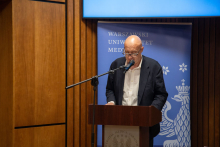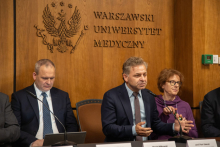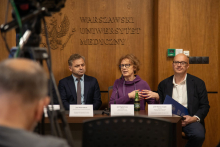Worldwide, about 300 million people struggle with depression. In our country, 1.5 million may be affected by the disorder. 80 percent of cases are patients aged 30-59. In other EU countries, the number of depressive patients is higher than in our country. However, according to experts, in Poland the peak of the disease is yet to come. A growing challenge is drug-resistant depression.
When drug-resistant depression is diagnosed
Drug-resistant depression can be said to occur when the use of two therapies consecutively - two successive drugs (which have indications in the treatment of depression) in the right dose and for a certain period of time - does not bring improvement in the mental state.
- This means that we are dealing with a patient who has been suffering from at least a moderate or severe episode of depression for at least several months - said Professor Piotr Gałecki, national consultant in psychiatry.
What is esketamine
- Ketamine has been known for quite a long time, as an agent used in anesthesiology. However, in 2019, intranasal esketamine was registered for the treatment of drug-resistant depression - stressed Prof. Agata Szulc, head of the Psychiatric Clinic of the Faculty of Health Sciences MUW - and thanks to this, the possibilities of treating drug-resistant depression have expanded and even opened up.
- It can be said that this is a breakthrough in the pharmacotherapy of depression, because esketamine acts quickly. Meanwhile, the drugs used so far for depression need time and proper dosage. To achieve an improvement in mental state, one has to wait. Usually from two to four weeks. Therapy with esketamine can have an effect very quickly, literally immediately, and this is visible - Prof. Szulc stressed. Although she also cautioned that it is not a miracle cure or panacea.
How to use it properly
- It is worth emphasizing that esketamine is a molecule that is added to an antidepressant drug. It cannot be used as monotherapy - Prof. Gałecki pointed out.
The mechanism of esketamine's antidepressant action is quite different from drugs classically administered for depression. And the effectiveness of this new molecule has been demonstrated only when used in combination with an antidepressant.
According to the drug program, intranasal esketamine can be administered for up to seven months. After that, if the doctor deems it necessary, maintenance therapy can still be used.
Where it will be available
- The therapy will be available on an outpatient basis. The drug is administered twice a week for the first month, and then once a week or once every two weeks for the next six months, depending on clinical indications - Prof. Gałecki reported.
Esketamine is administered intranasally. After administration, side effects may occur, such as increased blood pressure, psychomimetic or dissociative symptoms. Therefore, the patient should still be under health care for two hours after receiving this drug. And for the rest of the day must not drive a car. - The molecule is relatively safe - said Prof. Gałecki. - Usually if side effects occur, it happens at the beginning of the treatment and over time it is no longer a major problem.
When will it be available
Esketamine will be available under the drug program.
- This was one of the more difficult reimbursement processes. It lasted nearly two years. It is worth noting that this is the first drug program in psychiatry in Poland - said Maciej Miłkowski undersecretary of state at the Health Ministry, who heads the Drug Policy and Pharmacy Department. - We considered many issues, including in what form the drug should be administered, whether it should be available at a pharmacy, etc.
- The program goes into effect on July 1 this year. We expect that in early July there will be a draft order from the president of the National Health Fund on the criteria for signing contracts with entities, competitions will begin in August, and in September the first patient will be able to start the therapy - undersecretary of state at the Health Ministry announced.
The program is planned for two years. After the first year, it will be possible to analyze the data and check the effectiveness of the treatment.
Real help
- In the United States today, more and more ketamine clinics are being set up... We are not concerned with the widespread use of this drug. It must be strictly selected patients. Of course, like any drug, esketamine does not guarantee a 100 percent cure, but it is a hope for a sizable group of people who previously had no such hope - Prof. Szulc stressed.
- The effectiveness of esketamine in patients with drug-resistant depression is about 40 percent. This is a real help - concluded Prof. Gałecki.
Importance of education and accessibility
The symposium talked not only about the new drug program, but also about other key areas worth paying attention to in psychiatry.
- One such area is the still relatively low public awareness of the existence of depression, its consequences and the dangers associated with it - said Prof. Marcin Wojnar, head of the Department of Psychiatry at the Faculty of Medicine MUW. He stressed that sick people and their relatives should know when to seek help and where to go for it. According to the professor, a patient with symptoms of depression can start with primary care. Primary care physicians can successfully take care of such people, or at least start treatment. This will reduce patients' waiting time for first aid.
The symposium was attended by: Maciej Miłkowski, Undersecretary of State at the Ministry of Health in charge of the Department of Drug Policy and Pharmacy; Prof. Piotr Gałecki, national consultant in psychiatry, Head of the Department of Adult Psychiatry at the Medical University of Lodz, Prof. Agata Szulc, head of the Department of Psychiatry of the Faculty of Health Sciences MUW, Prof. Marcin Wojnar, Head of the Chair and Department of Psychiatry of the Faculty of Medicine MUW, Urszula Szybowicz, President of the "Nie widać po mnie" foundation.
The meeting was hosted by Prof. Mariusz Gujski, head of the Department of Public Health, Faculty of Health Sciences, MUW, Dean of the Faculty of Health Sciences.




